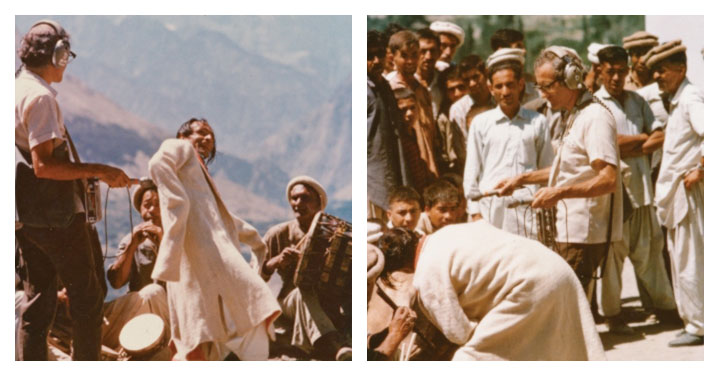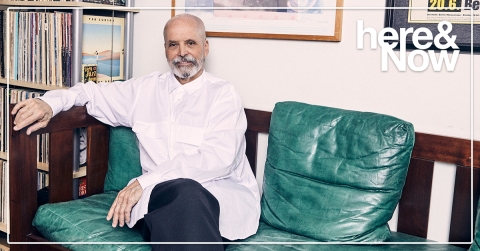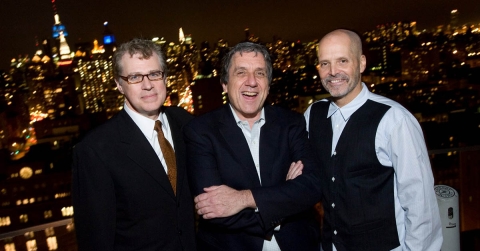By David Bither
The work of Nonesuch Explorer Series producer David Lewiston was recently featured at a symposium on the future of Tibetan music at the Rubin Museum in New York. Nonesuch Records' Senior Vice President David Bither moderated the panel and introduced Lewiston; here are his remarks.
By David Bither
The work of Nonesuch Explorer Series producer David Lewiston was recently featured at a symposium on the future of Tibetan music at the Rubin Museum in New York. Nonesuch Records' Senior Vice President David Bither moderated the panel and introduced Lewiston; here are his remarks:
Jac Holzman had foresight. He was also a businessman. He started Nonesuch Records as part of his Elektra company in 1964 as a vehicle for selling classical records from Europe that he licensed for next-to-nothing and packaged with hip illustrated covers, intending to find a college audience willing to part with $2.50 to hear obscure baroque and other out-of-the-mainstream classical music. He thought he could make money doing this and he did: he credits Nonesuch with keeping the Elektra label afloat and solvent enough to sign the Doors in late 1966.
His foresight led him to hire Tracey Sterne as the “coordinator” of Nonesuch. Tracey’s legendary open-mindedness, musical intuition and missionary zeal created an environment that was open enough that when Nonesuch’s Peter Siegel brought in a record of Balinese gamelan music—recorded by David Lewiston—it was thought of as important, right up there with the other classics.
(To be fair to Jac, it wasn’t the first “world music” record that Elektra or Nonesuch released…Holzman was a fan of folk music from everywhere and there were early Elektra releases ranging from Elektra #5—Voices of Haiti—to Theo Bikel’s Folk Songs of Israel.)
Tracey Sterne also laid the foundation for the label as it is today. For that, we are grateful.
It is hard for us now, awash in the 35,000 CDs released every year, to imagine a time when it was almost impossible to find recordings of music that did not reflect the popular currents of the day or the classics of the European tradition. Hard, too, to remember when you couldn’t carry a sophisticated multitrack recording studio in a small backpack. Hard, even, to remember that you couldn’t always choose which day of the week you wanted to hop a plane to Bali.
But in the early 1960s it took imagination, ears and a strong back to record Balinese gamelan music—or even to know what a gamelan was.
So David Lewiston’s life work was begun.
Over the next fifteen years, the Nonesuch Explorer Series—the first of its kind in this country and an inspiration to musicians of all kinds ever since—would issue over 90 albums from every corner of the world. David Lewiston was responsible, incredibly, for almost 30 of those Nonesuch Explorer titles, from Bali and Java, Tibet and Kashmir, India and Pakistan, China and Japan, Peru and Mexico and Iran.
These records not only formed a library of music that most people had never heard but also hard-wired generations of musicians and composers in North America and Europe who went on to create work that simply would not have otherwise existed.
Part of what made David’s work so remarkable was his curiosity. To range across the world—missing only sub-Saharan Africa, as far as I can tell—and to return with the Ramayana Monkey Chant, Quawwali singers from Pakistan, the Ghost Exorcism from Tibet, the shakuhachi and pipa from Asia, the fiestas of Mexico, Inca music of Peru: these are incredible musical riches and the stories behind them are equally incredible.
But David, and Tracey, also understood how this music needed to be presented to a world innocent of its very existence.
I had an email today from Jac Holzman who first asked me to extend his warmest regards to David. He also added this: "David always understood that indigenous music requires superb support materials; notes, photos and artwork that flesh out the context in which the music itself can better be appreciated and understood. David's work was the model for how this should be handled."
The generation of musical artists who came of age during what I will call “the Lewiston era” grew up with unprecedented information. The music of the world was in their ears—this had never happened before. Of course, there are legends about such cross-cultural revelations as Debussy hearing a gamelan orchestra at the 1889 Paris Exposition…and these no doubt influenced Western music in profound ways.
But it seems to me that the primary challenge facing composers and musicians today is in part due to David Lewiston and that is making sense of the world of music that we have learned exists over the past 40 years.
So it is with great pride and humble thanks that I introduce this man who not only helped to make our record company, Nonesuch Records, what it is today but also helped to make MUSIC what it is today.
David Bither is the Senior Vice-President of Nonesuch Records
-------------------------------------------------------



